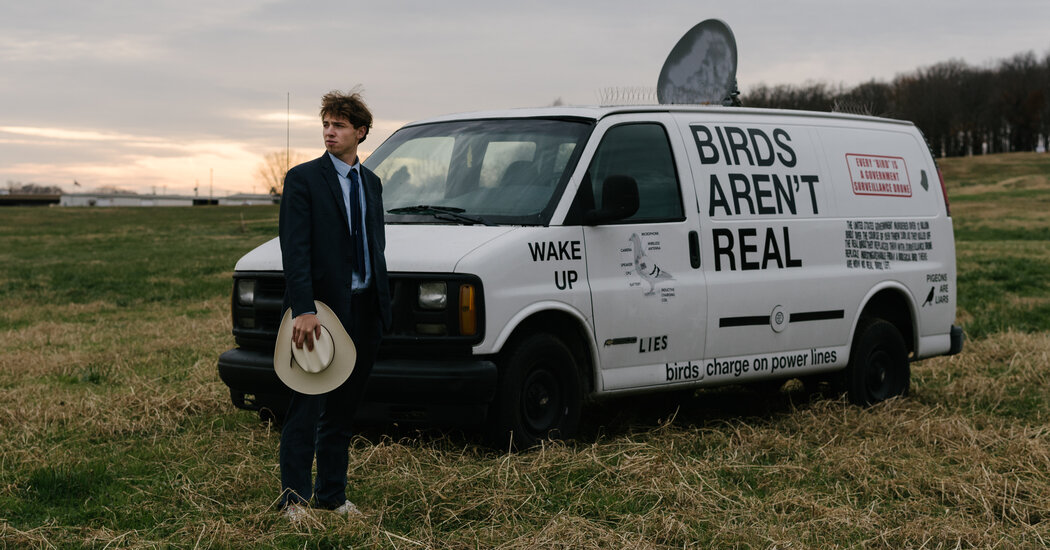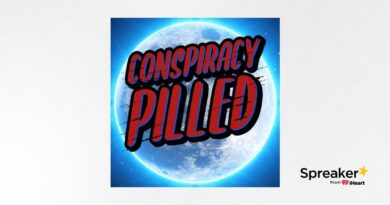Lesson of the Day: ‘Birds Aren’t Real, or Are They? Inside a Gen Z Conspiracy Theory.’

Lesson Overview
Featured Article: “Birds Aren’t Real, or Are They? Inside a Gen Z Conspiracy Theory.” by Taylor Lorenz
Have you ever seen, read or heard about a conspiracy theory? Do you believe in any? How concerned are you about people falling for them? Are they something that you, your family or your friends take seriously?
The Birds Aren’t Real movement contends that birds don’t exist and are really drone replicas installed by the U.S. government to spy on Americans. Hundreds of thousands of young people have joined the movement, wearing Birds Aren’t Real T-shirts, swarming rallies and spreading the slogan.
But is the movement real or is it a satirical comment on the absurdity of our post-truth world?
In this lesson, you will learn about this Gen Z-fueled conspiracy theory and what it says about our current society. In Going Further activities, you will share your own experiences of coming-of-age in a time of misinformation and make a recommendation for the best way to tackle the spread of conspiracies.
Warm-Up
Have you heard of the conspiracy theory known as Birds Aren’t Real? If so, what has been your reaction?
Before reading the featured article, take a few minutes to explore the Birds Aren’t Real website. Then, respond to the following prompts in writing or in discussion with a partner:
-
What did you learn about the Birds Aren’t Real movement? In your own words, what does the organization promote?
-
What’s your reaction to the website? What were your thoughts and feelings as you clicked through or watched the videos?
-
Do you think the Birds Aren’t Real conspiracy is real? What evidence supports your conclusion?
-
What questions do you have about the movement?
Questions for Writing and Discussion
Read the featured article, and then answer the following questions:
1. Who is 23-year-old Peter McIndoe and why did he create the Birds Aren’t Real conspiracy? Ms. Lorenz writes that Mr. McIndoe was “marinated in conspiracies.” How did his personal biography influence his fictional creation?
2. How did Birds Aren’t Real grow from a “spontaneous joke” to a viral movement?
3. Mr. McIndoe said, “A lot of people in our generation feel the lunacy in all this, and Birds Aren’t Real has been a way for people to process that.” Do you agree? Is it a helpful way to process the absurdity of the endless misinformation you see and experience online?
4. Why have others, like Cameron Kasky, 21, an activist from Parkland, Fla., joined the Birds Aren’t Real movement? How have members “become a political force” according to the article?
5. Why did Mr. McIndoe choose “to reveal the parody” behind his conspiracy now? What are his hopes for next steps?
6. The article concludes with a quotation from Mr. McIndoe:
“We have been intentionally spreading misinformation for the past four years, but it’s with a purpose. It’s about holding up a mirror to America in the internet age.”
Do you agree? In what ways does the Birds Aren’t Real movement hold a mirror to America? What does it show and reveal?
7. The article prompted many comments from Times readers. Robert Conger from Michigan wrote: “This is one of the most inspiring things I have read in awhile. These people are America’s future. You have to recognize the absurd to know the truth.” However, Yellow Dog in Oakland, countered: “I am more often confused by sarcasm than amused by it. Sorry to be a spoiled sport, but I doubt that many conspiracy theorists realize that this project is a joke. More conspiracy theories seems the last thing we need now. When you fight fire with fire, you’re likely to get burned.”
Which of the two reader comments resonates most for you? Do you think Birds Aren’t Real is inspiring? Or does parody fail if people don’t understand it? Do you think the movement is an effective form of media literacy?
Going Further
Option 1: Share your thoughts, opinions and experiences.
Respond to one or more of the following prompts in writing or through discussion with a partner or group:
-
What is it like to come of age in a time of misinformation and conspiracies? How do you process the madness of life online?
-
Why do you think conspiracy theories have become so popular on sites like YouTube, Facebook and Instagram?
-
Do you believe in any conspiracy theories? Have you seen conspiracy theories featured in videos, memes, podcasts or talk shows? How do you know when to quickly dismiss a theory as unfounded or absurd — and when to consider if there’s any truth behind it?
-
How concerned are you about people believing in conspiracy theories? Do you think conspiracy theories are just fun and interesting, or do you think they can lead to serious consequences? Are they ever dangerous?
If you would like to continue this conversation, you can share your thoughts and read the comments of other teenagers on our related Student Opinion prompt: Do You Think Online Conspiracy Theories Can Be Dangerous?
Option 2: Make a recommendation.
What do you think is the best way to combat conspiracies and misinformation?
Do we need more media literacy in schools to help your generation distinguish reliable from unreliable information on the internet? A more effective crackdown on online conspiracies and misinformation by social media companies like Facebook, Twitter and YouTube? Or governmental action, such as appointing a “reality czar.” Do you think parodies like Birds Aren’t Real can fight “lunacy with lunacy”? Or should we stop trying to mock and shame those who believe in conspiracies and engage in more “gentle, compassionate and patient” conversations?
Read one or more of the linked articles, or do your own research into fighting misinformation. Then persuasively present your case for the most effective way to tackle the spread of conspiracies and misinformation.
Option 3: Watch a film.
In the 10-minute Opinion video “What Do We Do About Q?” Kirby Ferguson argues that while QAnon conspiracy theories might seem ridiculous, the consequences are real.
Watch the film, and then discuss with a partner: What did you learn about why people believe in conspiracy theories? How persuasive is Mr. Ferguson’s argument? How did it add to or change your views on conspiracies and how to fight them? What questions do you still have about conspiracy theories?
Note to teachers: Please watch the film in advance to make sure it is appropriate for your students.
You can also find a media literacy lesson on the featured article by the News Literacy Project here.
Want more Lessons of the Day? You can find them all here.
*** This article has been archived for your research. The original version from The New York Times can be found here ***


